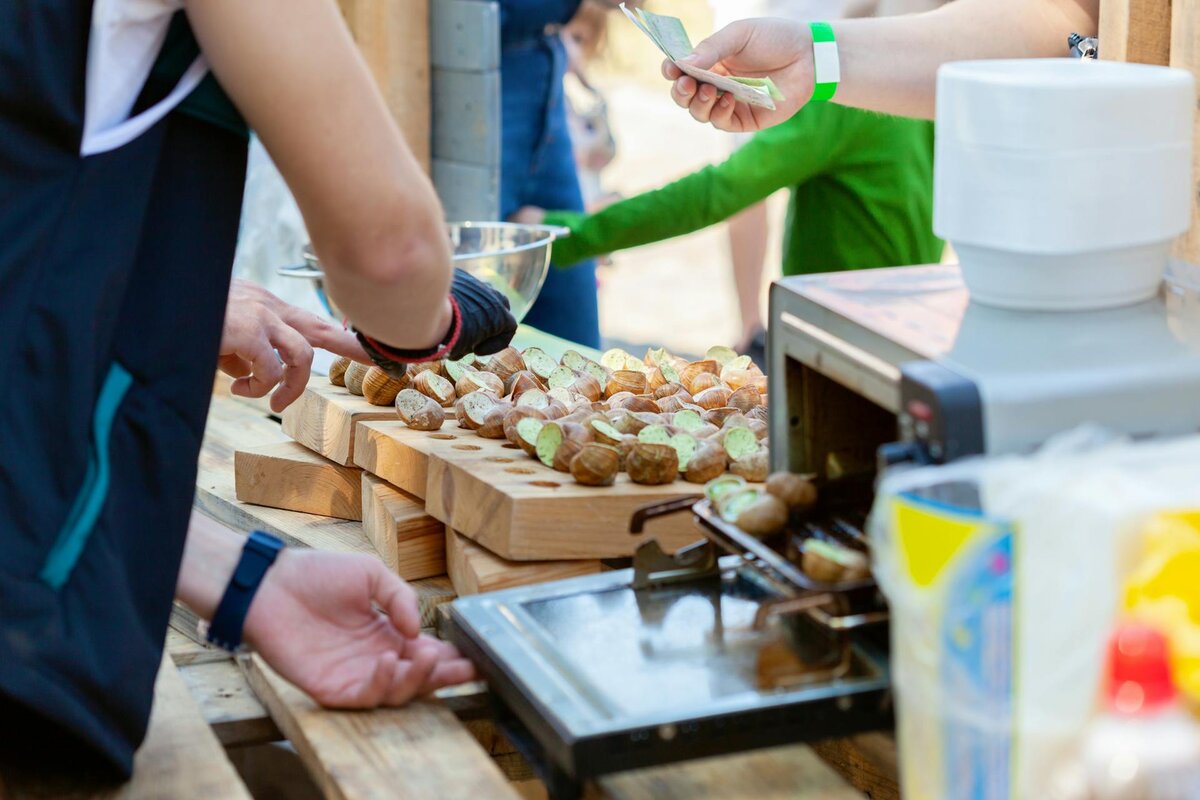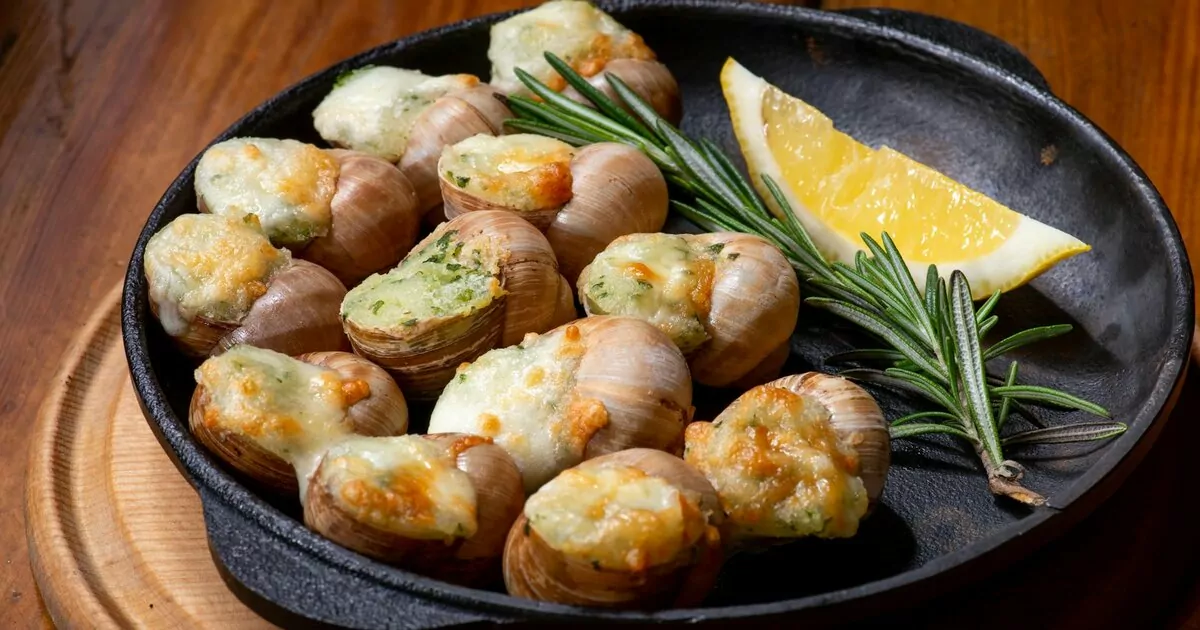When you’re pregnant, choosing safe and nutritious foods is crucial. Escargot, a delicacy enjoyed by many, might be on your list of foods to consider. But when it comes to pregnancy, it’s important to take a closer look at what’s on your plate. Understanding if you can eat escargot when pregnant is essential, as it’s a source of important nutrients that need to fit into a pregnancy-safe diet. Let’s dive into the world of escargot and uncover what expecting mothers should know about incorporating this unique dish into their meals.
On this page:
Unveiling the Nutritional Profile of Escargot
Escargot is a good source of lean protein, essential for the building blocks of life, especially during pregnancy when the need for protein goes up to support fetal growth. One serving of escargot can provide a pregnant woman with a decent amount of this vital nutrient without a lot of extra calories or fat.
Beyond protein, escargot also offers a variety of vitamins and minerals. They’re particularly rich in iron, a crucial component in the fight against anemia, a common concern during pregnancy. Adequate iron intake ensures that enough oxygen is transported in the blood to support the developing baby. Escargot also contains magnesium, which is important for muscle health and preventing cramps, and selenium, an antioxidant that helps protect the body’s cells.
Another notable nutrient in escargot is vitamin B12. This vitamin is key for the proper functioning of the nervous system and for brain health. Since B12 is mostly found in animal products, escargot can be an excellent source for expecting mothers, particularly those with dietary restrictions that might limit their intake of other B12-rich foods.
Escargot is also a source of omega-3 fatty acids, which are important for the development of the baby’s brain and vision. While fish is often touted as the go-to source for omega-3s, escargot can be a good alternative for those looking to diversify their sources of this important nutrient.
Analyzing Escargot Pregnancy Safety
Firstly, it’s crucial for pregnant women to consume escargot that has been thoroughly cooked. Undercooked escargot can harbor harmful bacteria, including Listeria, which poses a significant risk during pregnancy. Listeria can lead to listeriosis, a serious infection that can cause complications such as miscarriage, stillbirth, or severe illness in a newborn.
Secondly, the source of the escargot is equally important. Snails that are wild-caught or not raised for culinary purposes may come with a higher risk of parasites or contaminants. Purchasing escargot from reputable suppliers who follow strict safety protocols is essential to reduce any potential health risks.
In addition, pregnant women should be mindful of the portion size and frequency of consuming escargot. While escargot does provide beneficial nutrients like protein and iron, which are important during pregnancy, moderation is key. Overindulgence can lead to excessive intake of certain minerals, such as vitamin A, which in high amounts can be harmful during pregnancy.

Lastly, it’s always best to consult with a healthcare provider before adding escargot, or any new food, to a pregnancy diet. A healthcare provider can offer personalized advice based on individual health history and dietary needs.
Exploring the Health Benefits of Escargot During Pregnancy
During pregnancy, the body’s need for certain nutrients increases, making the choice of foods more critical. Escargot, a delicacy enjoyed by many, can be a source of these vital nutrients. Rich in protein, escargot can support the growth and repair of tissues, which is essential as a baby develops. It’s also a good source of iron, crucial for preventing anemia in expecting mothers by aiding in the production of hemoglobin.
During escargot pregnancy considerations, it’s noteworthy that it contains magnesium, which can help with muscle relaxation and reducing the risk of premature contractions. The presence of omega-3 fatty acids in escargot is also noteworthy. These healthy fats are important for the development of the baby’s brain and vision and may even support maternal mental health.
In addition to these nutrients, escargot offers a dose of vitamin E, an antioxidant that helps protect cells from damage. This can be beneficial for both the mother and the developing baby, contributing to overall health and potentially reducing the risk of certain complications.
Can You Eat Escargot When Pregnant: Guidelines for Expectant Mothers
Make sure the escargot is fully cooked. Eating raw or undercooked escargot is a no-go as it can harbor harmful bacteria and parasites, such as listeria and toxoplasmosis, which can pose serious health risks during pregnancy.
Consider the source. Opt for escargot from reputable suppliers who guarantee their snails are raised and prepared in sanitary conditions. This reduces the risk of contamination. When dining out, don’t hesitate to ask the restaurant about the origin and preparation of their escargot.
Moderation is key. Escargot is rich in nutrients like iron and protein, which are beneficial for pregnant women, but it’s also high in cholesterol and sodium. Balancing escargot with a variety of other proteins and healthy foods can help maintain a well-rounded diet.
Be mindful of allergic reactions. If you’ve never tried escargot before, pregnancy might not be the best time to experiment. Allergic reactions can be more severe during pregnancy and can be risky for both you and your baby.
Recognizing Escargot Pregnant Women Should Avoid
Not all snails are created equal, and some may be better left off your plate while expecting. Typically, the type of snail served as escargot in culinary settings is the land snail, particularly the species known as Helix pomatia, also referred to as the Roman snail or Burgundy snail. This variety is deemed safe for consumption when properly cooked.

Steer clear of freshwater snails, as they can be carriers of parasites like schistosomiasis, which pose severe health risks for both mother and unborn child. These snails are often found in slow-moving waters in tropical regions and are not typically served in mainstream cuisine but might be encountered in certain traditional dishes.
Avoid snails that have not been farmed for food purposes. Wild snails could have been exposed to pesticides or other chemicals that can be harmful during pregnancy. Even if the snail variety is generally safe, if it’s not sourced from a reputable supplier that ensures the snails are free from contaminants and raised in controlled environments, it’s best to skip it.
Managing Potential Risks: Side Effects of Escargot in Pregnancy
Digestive discomfort is one side effect some pregnant women might experience after eating escargot. Since pregnancy can slow down the digestive system, escargot’s high protein content may lead to feelings of fullness, bloating, or gas. While these symptoms are usually not a major cause for concern, they can be uncomfortable, especially during the later stages of pregnancy when there’s more pressure on the stomach.
Another concern is the risk of foodborne illness. Cooking escargot to an internal temperature of 165°F (74°C) is vital, as pregnant women need to avoid any harmful bacteria that could affect escargot pregnant health. Pregnant women are more susceptible to infections like listeriosis or salmonella, which can be particularly dangerous and even lead to complications such as preterm labor or miscarriage.
Escargot is often prepared with garlic and butter, which can increase the dish’s fat content. High-fat foods can lead to weight gain and may contribute to pregnancy complications like gestational diabetes. It’s crucial to consider how escargot fits into your overall diet and to consume it in moderation.
While allergic reactions to escargot are rare, pregnancy can sometimes heighten sensitivities or trigger new food allergies. If you experience symptoms like hives, itching, or swelling after eating escargot, it’s important to seek medical attention.
Escargot Preparation Tips for Expectant Mothers
Expectant mothers should ensure that escargot is thoroughly cooked to an internal temperature of 165°F to eliminate any harmful bacteria or parasites. Cooking snails properly also neutralizes a potentially harmful enzyme, which can be present in raw snails, that could otherwise cause a rare type of meningitis.
It’s advised to purchase escargot from reputable sources, confirming that they have been raised and processed in a clean and controlled environment. Preparing escargot at home allows for control over the cleanliness and cooking process. Begin by rinsing the snails with a mix of water and vinegar to clean them, but be sure to avoid using any strong detergents that can taint the snails.
When it comes to herbs and spices, expectant mothers might prefer to season their escargot with fresh herbs like parsley, garlic, and fennel, which not only enhance flavor but also add to the nutritional value without introducing high levels of salt or fat. Remember, moderation is key. Too much garlic, for instance, can cause discomfort, especially during pregnancy.
While enjoying escargot, pregnant women should pair it with foods high in vitamin C, such as bell peppers or citrus fruits, to boost iron absorption—a vital mineral for both mother and developing baby.
Making an Informed Decision on Escargot Consumption in Pregnancy
As you navigate the journey of pregnancy, deciding what to eat can often feel overwhelming. With the information about escargot’s nutritional benefits and potential risks at your fingertips, you’re now equipped to make a choice that aligns with your health needs and personal comfort level. Remember, it’s essential to consider how escargot is prepared and to follow the guidelines for safe consumption. As with any food during pregnancy, it’s always a good idea to consult with your healthcare provider. They can offer personalized advice, ensuring that you and your baby remain safe and well-nourished throughout your pregnancy.
